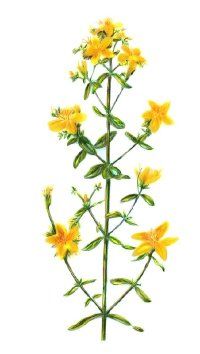St. John's wort is a common meadowland plant that has been used as a medicine for centuries. Early European and Slavic herbals mention it. The genus name Hypericum is from the Latin word hyper, meaning "above," and icon, meaning "spirit." The herb was once hung over doorways to ward off evil spirits or burned to protect and sanctify an area.
The species name perforatum refers to the many puncturelike black marks on the underside of the plant's leaves. Some sources say the plant is called St. John's wort because it blooms on St. John's Day (June 24); others say it was St. John's favorite herb, and still others note that the deep red pigment in the plant resembles the blood of the martyred saint.
Advertisement
Whatever its name origin, St. John's wort has a number of uses. It has been used to relieve muscle problems and to ease muscle injuries; it also reduces swelling and is used in certain herbal remedies to treat depression and anxiety.
Uses for St. John's wort
St. John's wort has long been used medicinally as an anti-inflammatory for strains, sprains, and contusions. St. John's wort also has been used to treat muscular spasms, cramps, and tension that results in muscular spasms.
The plant, especially its tiny yellow flowers, is high in hypericin and other flavonoid compounds. If you crush a flower bud between your fingers, you will release a burgundy red juice -- evidence of the flavonoid hypericin. St. John's wort oils and tinctures should display this beautiful red coloring, which indicates the presence of the desired flavonoids.
Bioflavonoids, in general, serve to reduce vascular fragility and inflammation. Since flavonoids improve venous-wall integrity, St. John's wort is useful in treating swollen veins. St. John's wort preparations may be ingested for internal bruising and inflammation or following a traumatic injury to the external muscles and skin.
The oil is also useful when applied to wounds and bruises or rubbed onto strains, sprains, or varicose veins. When rubbed onto the belly and breasts during pregnancy, the oil may also help prevent stretch marks. Topical application is useful to treat hemorrhoids and aching, swollen veins that can occur during pregnancy.
St. John's wort is reported to relieve anxiety and tension and to act as an antidepressant. It was once thought that hypericin interfered with the body's production of a depression-related chemical called monoamine oxidase (MAO), but recent research has shed doubt on this claim. Research now is focusing on other constituents, such as hyperforin and flavonoids.
Studies have shown St. John's wort extracts may exert their antidepressant actions by inhibiting the reuptake of the neurotransmitters serotonin, norepinephrine, and dopamine. The required dosage is three grams of powder per day, but it must be taken for weeks -- and sometimes several months -- before results are noted.
St. John's wort is useful for pelvic pain and cramping. According to the 1983 British Pharmacopoeia, St. John's wort is specifically indicated for "menopausal neuroses": Many women who experience anxiety, depression, and other emotional disturbances during menopause may benefit from this herb's use.
The National Cancer Institute has conducted several studies showing that St. John's wort has potential as a cancer-fighting drug. One study showed that mice injected with the feline leukemia virus were able to fight off the infection after just a single dose of St. John's wort.
In the next section, you will learn how to prepare St. John's for herbal remedies and some of the potentially dangerous side effects.
To learn more about treating common medical conditions at home, try the following links:
- For an overview of all of our herbal remedies, go to the main Herbal Remedies page.
- To learn more about treating medical conditions at home, visit our main Home Remedies page.
- One of the best things you can do for your health and well being is to make sure you are getting enough of the vital nutrients your body needs. Visit our Vitamins page to learn more.
This information is solely for informational purposes. IT IS NOT INTENDED TO PROVIDE MEDICAL ADVICE. Neither the Editors of Consumer Guide (R), Publications International, Ltd., the author nor publisher take responsibility for any possible consequences from any treatment, procedure, exercise, dietary modification, action or application of medication which results from reading or following the information contained in this information. The publication of this information does not constitute the practice of medicine, and this information does not replace the advice of your physician or other health care provider. Before undertaking any course of treatment, the reader must seek the advice of their physician or other health care provider.Before engaging in any complementary medical technique, including the use of natural or herbal remedies, you should be aware that many of these techniques have not been evaluated in scientific studies. Use of these remedies in connection with over the counter or prescription medications can cause severe adverse reactions. Often, only limited information is available about their safety and effectiveness. Each state and each discipline has its own rules about whether practitioners are required to be professionally licensed. If you plan to visit a practitioner, it is recommended that you choose one who is licensed by a recognized national organization and who abides by the organization's standards. It is always best to speak with your primary health care provider before starting any new therapeutic technique.
Advertisement
